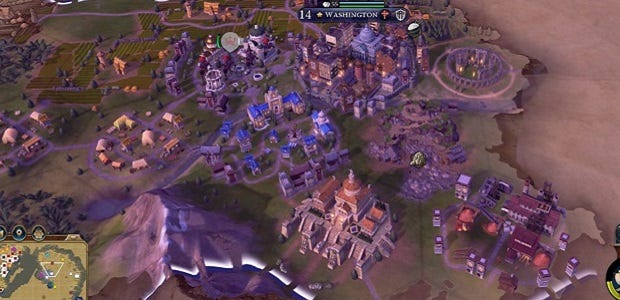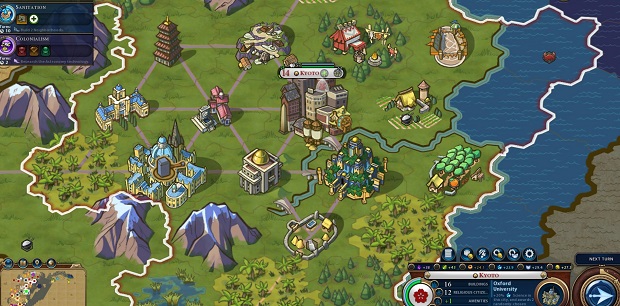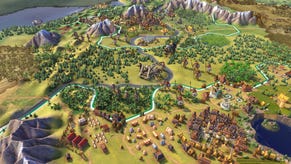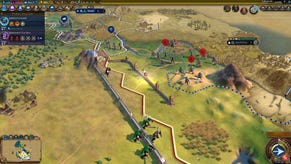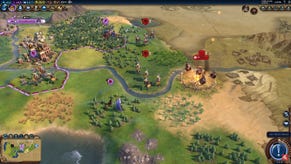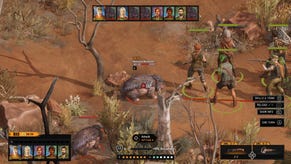Wot I Think: Sid Meier's Civilization VI
Monumental
The question I've been trying to answer, as I spent a final few hours with Civilization VI [official site] before writing this review, is simple: is it the best game in the series, or the best game in the series bar Civ IV? After more than a hundred hours of play, I still can't say for sure. The fourth game has had ten years to work its way into my mind and it has endured, Civ VI is still young.
What I can say is that it's a radical redesign, true to the spirit of the series but finding new ideas in its elevation of the map from backdrop and resource-container to new plane of strategic and tactical importance. Few 4X games emphasise the importance of geography to this degree. In Civ VI, the land makes a mark on you, just as you make your mark on the land.
If this new engagement with the map had been attached to just one feature, it might come across as a gimmick, or the foundation for a concept not yet fully constructed. As it is, the genius of the game's design isn't in the ideas themselves, but in the careful stitching together of those ideas. This is a very busy Civ game, with lots of different cultural, technological and military plates to spin, but nothing works in isolation. If you're chasing religious advancement, for example, that has an impact on the other cultural policies you discover and unlock, and certain relationships will be affected by your application of religion.
Government and religion are both customisable, the latter in a similar approach to Civ V, the former in an entirely new card-based system. There are still base governments to choose from, unlocked in groups of three as you move through eras, but they're modified using cards unlocked on the cultural tech tree. That allows for a government to suit just about any scenario and makes for much more interesting choices and stages of play – you could gamble by switching to policies that boost military production before entering a war, for example, and then switch out those policies for ones that keep the folks back home happy once the armies are built.
The risk is that if your initial assault isn't strong enough, you might be left in need of more units without the boosts used to build the initial force. I've deliberately begun periods of reconstruction and actual artistic renaissances or ages of scientific enlightenment, purely by altering government to suit the mood of the times. In the late stages of the game, there are so many policies to pick from, and so many slots available for cards in the modern governments, that you can push your people in just about any direction.
Religion, particularly before it is properly organised, is more intimately related to the land. As in Civ V, upon founding a religion you choose a pantheon, and many of these give boosts based on terrain and resources. Later, you're able to define more traits, which allow for production of buildings with various properties, or affect the way your faith changes your cities and units or those of your neighbours. Broadly speaking, religions fall into one of two camps: they're either active in the world, taking strength from conversion, or self-contained, bringing great benefits to home-grown followers but tending not to proselytise.
When an AI civ follows one of the former types, there's a tendency to produce avalanches of apostles, sometimes long after every city within reach has been converted, and there is a recurrent problem with this kind of behaviour. As much as the new hard-coded personality traits have improved the credibility of the AI, by giving them distinct approaches to diplomacy and guiding their actions to an extent, the basic triggers that decide what should be built and when sometimes seem to get stuck in a loop. You'll see wandering settlers quite often in the mid- to late-game, presumably produced because an AI realises it needs more cities to catch up with the competition, but left unsettled because there isn't actually a decent location in which to build. Most of the AI stumbles seem to be a case of the left hand not talking to the right hand, leading one “need” to over-ride a more sensible alternative, and while it's disheartening to see a nation treading water and cluttering the map while stuck in one of these apparent loops, they do break out eventually.
There are two great additions to diplomacy, and together they're just about strong enough to make the AI issues a frustration rather than a major failing. The first is the leader traits, which I've already mentioned briefly. Essentially, they're distinct enough from one another that every civ really does feel unique and on the higher difficulties particularly, dealing with them requires walking a fine line between appeasement of those traits and aggressive disobedience. Push too hard too soon and you might end up in an unwinnable, draining war; bend over backwards for too long and you'll spend a lifetime walking on eggshells and making little progress.
It's a smart system, encouraging competitive thinking in a way that suits the game's overall structure. This Civ is rich with historical flavour - from the named Great People and their unique works to the gorgeous inked maps and evolving soundtrack - but behind all of those thematic flourishes, it is, quite explicitly, a game of numbers. History as a track and field event. There are multiple finish lines and various ways to reach them, but more than ever, it's important to ensure every step takes you toward one of those lines.
One area where that can be clearly seen is the second of the changes to diplomacy: Casus Belli. These are reasons for declaring war and there are plenty of them, unlocked as you move through the eras. The most simple example is a war of liberation, used to reclaim a city that was taken and occupied by another civ. By declaring a war of that kind rather than the default “Surprise War”, you receive less of negative impact on your standing with other civs. Manipulating these rules of conflict, and discovering how they overlap with leader traits, makes the military side of the game as rewarding as it's ever been, and the actual wars make best use of the single-unit-per-tile innovation of Civ V. Terrain matters, siege units are far more useful, and cities can be made resilient but are always at risk from a determined assault.
The two major features that elaborate on the relationship between a civilization and the land that it occupies relate to the cities themselves and the tech tree(s). Of all that has changed, it's the cities that are convincing me that I'll find it hard to go back to an older Civ now that I've spent so much time with VI. Districts are the visible aspect of the new urban management, zones that take up a tile within the city's borders, and become home to buildings of a certain type. Universities, temples and marketplaces aren't going to appear in every city now – they require the correct kind of district, and some places will make better use of their tiles without those specialisations.
This changes the game in all manner of ways, but most importantly it means that you rarely end up at that tedious point where you're building every available improvement in every city you own simply because there's nothing else to do. Even a seemingly minor building is a decision now rather than a default, and that's integral to the flow of the game. Civ VI wants you to decide whether Boston is a university city or not, and your reasoning as to what belongs where will go a long way toward determining how effective each city is in the long-term.
Tech trees aim to make similar changes, though less elaborate. Certain actions taken in the world provide an inspiration boost to a specific tech, giving half of the research points necessary to earn it immediately. This might involve using a builder to improve a resource or getting into a scrap with a certain kind of unit. It's another example of the interplay between systems, the tech trees now wrapped up in your actions and discoveries so that they don't feel separated from the rest of your playstyle.
There are two trees now, one containing civic ideas and the other containing 'scientific' advances. Not only does that give culture more power, as the accumulation of culture points are actually used to unlock the civic tech tree now, it also means that you might meet nations that are technologically advanced but culturally inferior, and vice versa. While that doesn't mean the Civ view of advanced societies isn't still somewhat single-minded – some nations are more advanced and more powerful, and the details aren't as important as the leaderboard rankings – there's more nuance than in previous games, and more variety in the kinds of people you'll meet along the way.
Given how busy the game is, with new features coming into play regularly as you advance, the UI is remarkably uncluttered. Most of the information you need is either in the bottom right of the screen, which guides you through the flow of a turn and highlights what you need to do before continuing, or in a bar along the top of the screen. That's where you'll find information about resources, envoys and your various forms of income.
Despite its overall tidiness, there are some aspects of the UI that don't quite hang together though. To give one example, I find picking a pantheon and adding beliefs to religions more stodgy than I'd like, every option being dumped into a long scrollable list, with no way to see a read-out detailing how a choice would benefit your civ. If I'm choosing Stone Circles as a belief, I'd like to see a tooltip saying how many applicable resources are within my borders, both worked and unworked.
For every minor complaint, there are three or four improvements to celebrate. City States, one of Civ V's most interesting but flawed features, work superbly now. Again, they tie back into other systems, with some AI having traits that define how they feel about your relationships with these smaller nations, but the big change is in how those relationships actually work. Rather than having to top up your friendship through regular attentions, you now deploy envoys and leave them in place, reaping the benefits. There's a competitive element here as well, though, with suzerain status possible, granting a unique bonus, which adds another interesting wrinkle to the whole system. Some of those bonuses can be game-changing when married to the right kind of Civ – La Venta's Colossal Heads plus faith-based Civ equals very happy early years – while others aren't worth fighting for if they're not a natural fit for your current playstyle.
There's something similar happening in the realm of Great People, who are now drawn from a pool when civs have enough points to attract them or resources to buy them. As with Wonders and City States, everyone is competing for the same bonuses, which makes acquisition time-pressured and more cutthroat than previously. With Wonders, I don't find quite as much need to rush for them thanks to the requirements for construction being much more complex – simply having the tech isn't always enough, and some Wonders are locked out if you don't have the right districts or geographical features to exploit. An educated guess, and some knowledge of your neighbours, can help you to concentrate on Wonders that the whole world isn't mid-way through constructing already.
All of this combines to do what I thought might be impossible: Civ VI breaks all of my old habits. I'm the pacifist Civ player who now enjoys starting and finishing a fight, and I'm the culture-hungry tourist magnet who has built steaming great industrial empires. Civ VI demands flexibility of thought and function, and it rewards it handsomely with a game that responds elegantly to all kinds of different playstyles
It's a treat to look at as well. I adore the strategic map in particular, but the expressive units and distinctive tiles are always lovely. A sountrack that moves through the time periods along with your civ is icing on a delicious cake.
Imperfect AI is the fly in the ointment, as it is for the vast majority of 4X games. It's a shame that the flaws in that department are so apparent at times because in almost every other regard, this is an innovative and extremely thoughtful take on a series and formula that feel as old as PC gaming itself. Where Civ VI makes changes to that formula, they are improvements across the board, some bolder than others but all vital to the overall structure of a game that understands how to build compelling, overlapping strategic systems.
It is, quite simply, a thing of wonder, and a late contender for my personal game of the year.
Civilization VI is out now for Windows and is available through several digital retailers for £50/$60/€60.
